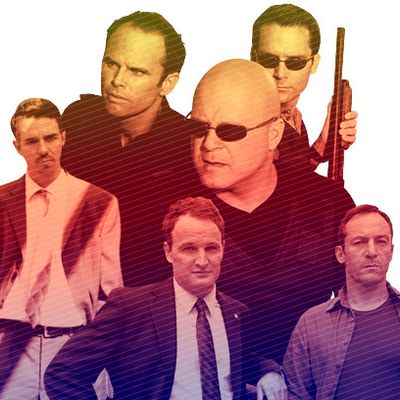
After Breaking Bad’s midseason finale, we have nearly an entire year until the show’s last eight episodes air next summer. And until then, fans are left with holes in our hearts and in their viewing schedules that can only be filled with a propulsive serialized drama filled with suspense, violence, and a contrast between ordinary family life and intense criminality. (Was this void originally carved out by The Sopranos? Perhaps.) As much as there’s the perception of Breaking Bad as a singular achievement in narrative television, it’s neither the first nor the only great show. Here are three other shows that should scratch that Breaking Bad itch until Walt & Co. return — series that will make it just as difficult to stop saying “Okay, just one more episode … ” And unlike Breaking Bad, since these shows have already ended, you don’t need to worry about being left hanging for months.
Five Days (two seasons, ten episodes, available on Netflix)
Structurally, this British series is nothing like BB: Each episode is set on a specific day of a police investigation, so it leaps forward in time and has more of a procedural vibe. Each season covers one case, and over the course of the five episodes traces it from the initial crime (“Day One”) through the conclusion of its investigation (in season one, “Day 79,” and in season two, “Day 102”). Season one covers a murder and missing persons case, while season two investigates an apparent suicide, and both share Breaking Bad’s eye for dramatic ripple effects: Jesse’s choices affect his rarely seen little brother, a Madrigal executive we’d never seen before kills himself because of Walt’s actions, and crimes rarely have just one victim. BB and Five have different approaches, but both center on dread. There’s peripheral sadness, sure, and plenty of anger and fear, plus bonus frustration and disappointment. But dread looms over all of it — for the characters and for the audiences alike. Everyone’s in perpetual danger, and there’s an agony to every small gesture.
Brotherhood (three seasons, 29 episodes, available on Amazon and iTunes)
Breaking Bad uses its violence to seduce its audience, to dazzle us in a certain way. Gus’s melted face doesn’t serve as a moment of horror so much as one of triumph; the prison killings on Sunday’s season finale were part of a buoyant montage. The characters on Breaking Bad are more or less proud of their violence. Not so on Brotherhood, Showtime’s little-seen series from 2006 about two brothers — one pristine politician, one career criminal — entangled in organized crime in Providence, Rhode Island. The violence here terrifies the characters, even as they engage in it, ripping off ears and battering girlfriends. It horrifies them, and it horrifies the audience. But less horrifying and more just plain-old great are the performances. Jason Isaacs is haunting as the prodigal son, Jason Clarke is all blustery and terrified as the precariously ordained golden child, and Ethan Embry (really!) is devastating as the doughy, miserable police officer who grew up with both brothers. Brotherhood shares BB’s narrative tension and sense of place, but Breaking Bad exists in a relatively black-and-white moral universe, with very little ethical ambiguity. Brotherhood’s a nice break from that — a show steeped in social quandaries, where loyalty is more important than greed — but neither pulls you in a very good direction.
The Shield (seven seasons, 88 episodes, available on DVD)
Walter White is not TV’s only antihero, though he represents a sort of modern spin on the tough guy as the nerd-turned-villain. The Shield’s Vic Mackey (Michael Chiklis) is more in the traditional vein: a muscular macho corrupt cop who often lets his fists do the talking. But Vic Mackey’s not a dummy, and his ability to manipulate those around him, to lie, to plot, to strategize — he could give Walt a run for his (dirty) money. The shows share similarly expansive criminal universes, with character actors and actresses aplenty, and though The Shield has more of an ensemble, most of its best storylines revolve around Vic and his underling–protege–ostensible friend–victim Shane (Walton Goggins, excellent). It’s a different dynamic than Walt and Jesse’s, but maybe more agonizing because for all the ways Vic is a horrendous murderer and violent danger to himself and others, he thinks of himself as a guy who’s just trying to do the right thing, even if that means things gets a little messy along the way — even when it sometimes affects his sidekick Shane. We could go on and on about how great The Shield is, but the most important reason to watch all of it before Breaking Bad’s final eight episodes is that The Shield currently holds the crown for best series finale ever, precise and shocking, yet still the most perfect and logical ending for all that came before it. Even if BB is a better series on the whole, it’ll have a tough time topping that finale.

